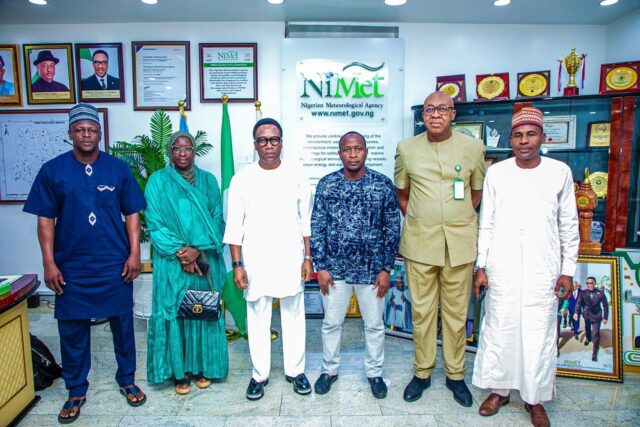
The Nigerian Meteorological Agency (NiMet) has reaffirmed its commitment to strengthen food security systems in Nigeria and the Sahel region.
During a recent courtesy visit, the Permanent Interstate Committee for Drought Control in the Sahel (CILSS) team met with NiMet officials at their Abuja headquarters.
Director General and CEO of NiMet, Professor Charles Anosike, welcomed the delegation and outlined the agency’s efforts in enhancing climate services. He emphasized NiMet’s vital role in delivering early warnings, managing disaster risks, and improving food production outcomes.
He noted NiMet’s collaboration with the Federal Ministry of Agriculture and Food Security to downscale seasonal forecasts for farmers. These tailored forecasts help farmers make better decisions, ultimately boosting agricultural yields and resilience.
“Climate-related disasters continue to challenge food production. A science-based approach helps us anticipate and act before crises worsen,” said Professor Anosike.
Transitioning to long-term strategies, he introduced the National Framework for Early Warning and Early Action, developed by NiMet under guidance from the World Meteorological Organization (WMO). This framework promotes coordination among stakeholders in climate resilience, disaster reduction, and food security.
He stressed that sharing this framework with relevant agencies would ensure synergy, reduce overlapping responsibilities, and improve national emergency responses.
In response, Mr. Williams Massaoud, who led the CILSS delegation, praised NiMet’s contributions to meteorological services across the region. He underlined the agency’s crucial role in supporting regional systems that track and mitigate food crises.
Mr. Massaoud explained that the mission to NiMet was conducted under the PRISISAN Project—an initiative to build durable and innovative Food and Nutrition Security Information Systems (FNSIS).
“The goal is to help Sahel and West African countries develop robust systems for managing food and nutrition challenges,” he stated.
The PRISISAN Project includes partners such as the Food and Agriculture Organization (FAO), World Food Programme (WFP), and Nigeria’s Federal Ministry of Agriculture and Food Security (FMAFS). Also represented were members of the Cadre Harmonisé Taskforce and other development organizations.
Together, these bodies are working to integrate meteorological data into decision-making platforms used to monitor food availability, nutrition levels, and climate shocks.
Mr. Massaoud stressed that combining technical data with local insights could greatly improve emergency responses and long-term planning.
He expressed optimism about continued collaboration, stating, “With NiMet’s support, our regional systems can better respond to food crises and adapt to climate realities.”
Professor Anosike concluded the meeting by urging a united front among all stakeholders. He said effective food security requires shared information, early warnings, and integrated planning.
“Now more than ever, we must act together to strengthen food security systems that are data-driven, inclusive, and resilient,” he said.
The visit marks a new chapter in regional collaboration aimed at preventing food shortages and enhancing nutritional outcomes amid worsening climate threats.
In conclusion, the renewed partnership between NiMet and CILSS reflects Nigeria’s strategic commitment to sustainable agriculture and proactive disaster response.
By merging meteorological intelligence with policy and humanitarian efforts, the two institutions are laying the foundation for a more secure and climate-resilient West Africa.





















